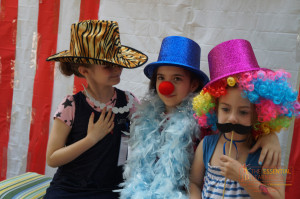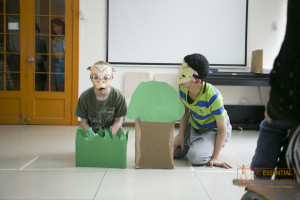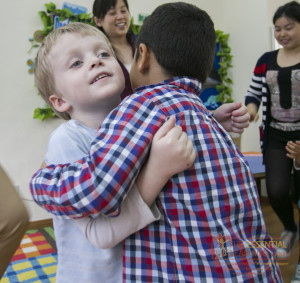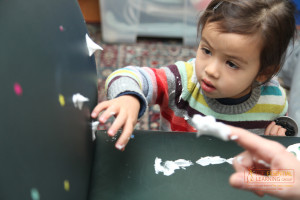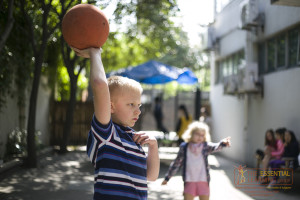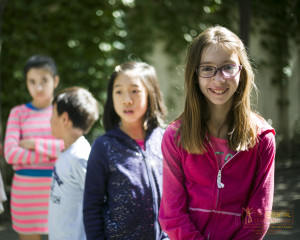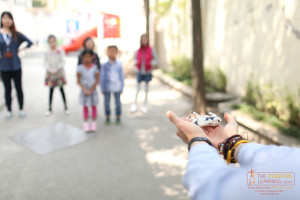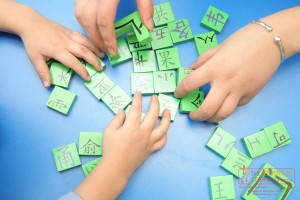By Robin Shepard, Early Intervention Program Leader
Playing is a natural part of childhood. It is so natural, in fact, that it is easy to forget how critical it is to helping children acquire new skills in every developmental area (social, emotional, behavioral, cognitive, sensory and motor).
We call this process “learning through play,” and while all children do play to some degree, all play is not equal. There are certain types of play which help children acquire the foundational skills they need for the future. Here are some ways that we, as parents and educators, can help facilitate this process.
1. Create Non-Virtual Spaces
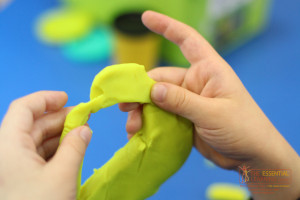
We live in a dazzling age of technology. Today, there are many more alternatives to ‘real-world play’ than there were a generation ago. While there are many educational and developmental benefits that technology can provide, there are also important foundational experiences and skills that cannot be gained from looking at a screen.
By nature, apps and video games create the scenes, characters, and action and there is no need for children to develop their own imagination and creativity. Additionally, in order to learn basic social interactions, children need to focus on each other. Encourage your children to take part in social activities and play-dates without electronics; you’ll soon notice a difference in the way that they interact with each other and use their imaginations.
2. Enter the Land of Make Believe
Whilst ‘play’ can refer to many different activities, the kind of play educational researchers find the most beneficial is pretend or make-believe play. Make believe play happens when:
- Children create a pretend scenario (“I’m going to pretend that I am the doctor and you are the mom and you have a sick baby”).
- Children play well-defined roles and follow the rules for how to act when playing a particular role (i.e. the “doctor” acts in a specific way, the “patients” act as well.
- Children use symbolic props and can invent props when they don’t have them.
- Children use language extensively. They discuss who they are each going to be and what will happen during the play. They also use role speech and adjust the way they talk, depending on the specific role they play.
Make believe play helps children: learn how to make decisions, solve problems, exert self-control, follow rules, and regulate their emotions. Oh, and by the way, it’s really fun!
3. Encourage Social Understanding
We want children to make friends and learn to get along with others as equals. Make-believe play facilitates an understanding of cause and effect; it allows children to realize that, in order to get what they want, they have to act in a certain way that may be different from their usual behavior.
During play, each scenario involves both verbalized and non-verbalized rules that have to be followed by everyone involved to allow play to progress. If a child acts outside of the agreed upon structure and rules, the play will stop. Most of the time, the children will adapt and work together to extend the play for as long as possible. Play therefore also allows children to understand the concepts attached to social infrastructure and compliance with rules.
4. Include “Play Mentors”
As the play-date organizer, try to include children of an older age to interact with your child. Older children typically use a more developed set of skills to create and implement play scenarios – skills they have gained from previous play experiences. By interacting with them, your child will learn and adapt to the more mature play environment, thereby accelerating his or her rate of development.
5. Foster Creativity
An important aspect of educational play is the creative expression it allows for the children involved, as they create their own scenarios, characters and storylines. Provide them with a range of materials and items to use; by crafting their own props, their creative ability will be strengthened, making the play even more beneficial. Thomas Edison said it very well, “To invent, you need a good imagination and a pile of junk.”
6. Let Them Get Physical
If you’re worried about your child’s physical skills, educational play could be a significant part of the answer. During play, children will utilize their coordination skills, balance, strength, flexibility and general movement when doing things such as running, crawling, jumping and dancing. For peace of mind, keep the kids in an environment well-suited to a wide-range of movement without injury.
7. Facilitate Cultural Understanding
As kids interact with each other during play, they will unknowingly be gaining invaluable knowledge of cultural norms and contexts. Wherever you’re situated, by including children of various nationalities and ethnic backgrounds in the gatherings you organize, you’ll be helping your child adapt to cross-cultural and multi-lingual interaction.
8. Enable Environments for Negotiation
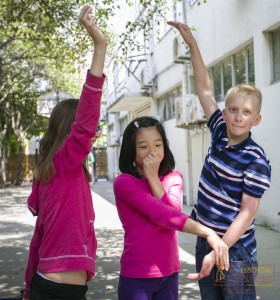
One thing you’ll notice when you watch your child during play is their profound ability to negotiate with the other children involved. They may be deciding on the rules to follow, or the nature and direction of the scenario, or the assignment of characters among themselves. Either way, encouraging educational play will also encourage the development of essential negotiation, compromise and communication skills.
9. Find a Balanced Way to Get Involved
As you watch over the play, you’ll have to find a balance between mediating the situation and allowing the children to carry out the play as they intend; both will be needed at certain points. By letting them resolve conflicts and navigate past differing opinions on their own, their ability to get along, compromise with others, and adapt to social settings will strengthen. On the other hand, stepping in at times when the play cannot continue due to unresolved tension will remind them of the rules to be followed.
Additionally, if you observe the play from a distance and notice the children getting stuck at a certain point, rather than stepping in and solving the problem for them, try introducing a prop or another piece of equipment which they might use the solve the problem – but let them try to arrive at the conclusion on their own.
10. Trust the Process
Today, many early childhood education programs incorporate the fundamentals of learning through play every day. Although learning through play may seem like an unproductive concept at first, trust in the process. If professionals are incorporating play into your child’s curriculum, have faith in their experience, and patience in the progress of your child. At ELG we often find that even skeptical parents soon realize the great potential to be had through play once their child starts to show signs of improvement. Allow yourself to witness the great impact and wide range of learning opportunities that play can offer your child.
Robin Shepard
Program Leader
Before joining The Essential Learning Group in 2013, Robin worked with children in a mainstream international school environment in Guangzhou. She spent over 4 years developing curricula that incorporated music, full body movement, and learning through play.

